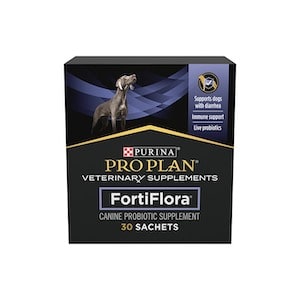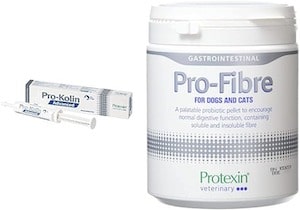Whenever we have an upset stomach, we often use a bottle of Gavison to get relief from the discomfort. Our furry friends also face such issues. But, Can dogs have Gaviscon? The question is legitimate as the medicine is designed for us and not the dogs.
Gaviscon is an antacid that helps to neutralise excess stomach acid and creates a protective barrier above the stomach contents. The medicine is for human use and that’s why it’s crucial to analyse the prospects such as signs, and symptoms of indigestion to figure out whether or not it’s good for dogs.

You Might Also Like:
Can Dogs Have Gaviscon?
In general, this antacid is used for resolving heartburn, indigestion, or stomach upset issues in humans but, a vet often prescribes them for treating moderate-level symptoms in dogs as well. This means you cannot randomly dose your dog with Gaviscon.
Now, before we get onto how to use it for treating indigestion and stomach upset issues in dogs, let’s understand the causes and symptoms.
Indigestion in dogs – Causes & Symptoms

Indigestion in dogs affects dogs of any age, breed, or size. They get uncomfortable, feel sick, and feel unhappy while suffering from this condition. Here are some of the common causes leading to indigestion in dogs:
- Inflammation of the intestine or the stomach
Infections, allergies, parasites, or foreign bodies can trigger inflammation in the stomach or intestine. There is muscle contraction and it can lead to diarrhoea or vomiting.
- Overeating or dietary changes
If the dog is eating too much or there are dietary changes, it will suffer from indigestion. The stomach is not able to digest the food properly and it can accumulate gas which leads to indigestion and at times, bloating.
- Excessive acid production
Anxiety, stress, or ingestion of certain food which produces too much acid, often leads to acid reflux or heat burn in dogs’ stomachs.
Symptoms of indigestion in dogs
You may observe the following signs and symptoms when your dog is suffering from indigestion:
- Vomiting
- Weight loss
- Diarrhoea
- Bloating
- Pain
- Lip licking
In addition to vomiting, diarrhea, and pain, some behavioral symptoms like whining, restlessness, and possibly even dog wet dreams may indicate your dog has indigestion.
Tips For Using Gaviscon For Dogs

When your dog is suffering from symptoms, you can use Gaviscon for them. However, it’s only useful for treating mild to moderate-level indigestion and stomach upset issues. You can consider the tips below:
- Avoid offering Gaviscon to dogs on an empty stomach. Otherwise, the existing condition may get worse.
- Before using a Gaviscon bottle, check it and make sure that the presence of sodium is less as excessive amounts are harmful to dogs. You can use regular Gaviscon tablets or Liquid-strength Gaviscon.
- Now, you must consult your vet regarding the frequency and measurement. The general thumb rule is to give a tablespoon of liquid Gaviscon (regular strength) four times a day. If you are using tablets, give one or two of them 4 times a day.
Using Gaviscon without Vet’s advice – health hazards
Remember, it’s not a cure and you can only use it for mild or moderate indigestion issues for your dogs. While it’s prescribed by the vet for treating stomach upset issues you must avoid using it by yourself. Here is why:
- If you use Gaviscon without knowing the exact cause of indigestion, it might not resolve the issue. This means, that if the stomach upset issue is caused because of an infection, inflammation, or a foreign body, it won’t treat the underlying issue.
- Gaviscon can interfere with the existing medications and reduce their efficacy or cause different reactions in your furry friend’s body. For instance, your dog is receiving antifungals, antibiotics, anti-inflammatories, or anticonvulsants. Gaviscon will cause disruption by reducing the effectiveness and absorption capacity which eventually compromises the dog’s health.
- Even if you are using it in small quantities, some dogs might still not have the capacity to handle it. Also, it’s difficult to anticipate how Gaviscon will react after ingestion. So, if given without a proper vet consult, they may cause allergic reactions and lead to issues such as constipation, vomiting, lethargy, or diarrhoea. If the reaction is severe, the dog may face aluminium toxicity, metabolic alkalosis, or impaction.
Alternatives Of Gaviscon
For owners looking for proper medications as alternatives, there are some antacids to consider. But, remember, they are not substitutes for Gaviscon even though they help deal with similar symptoms.
Also, there aren’t many antacids that are designed for dogs so, the list will include alternatives that are actually used for humans but, if used properly are safe for using it on dogs.
Here are some ingredients of antacids that deal with similar issues as Gaviscon does:
- Calcium bicarbonate – is found in some human antacids. This compound helps neutralise stomach acid and also improves bone health as it offers calcium. But, if not used properly, dogs may face issues such as bloating, gas, and constipation. Dogs having high blood pressure or kidney disease must not be given Calcium bicarbonate.
- Aluminium hydroxide – this mineral compound can assist in controlling phosphate levels and stomach acids in dogs with kidney failure. But, the compound can also lead to appetite, bone loss, loss of appetite, or constipation issues in dogs.
- Sodium bicarbonate – also referred to as baking soda, comes in handy while dealing with gastric and stomach pain issues. Dogs with high blood pressure must not be given this and dosage needs to be precise otherwise, a dog will suffer from issues like vomiting, diarrhoea, and electrolyte imbalance.
- Magnesium hydroxide – helps with constipation and reduces stomach acid. But, this compound can also cause issues like kidney damage, dehydration, and diarrhoea.
These are the ingredients of antacids that can provide similar results to Gaviscon. Here are some of the brands that include these compounds as the ingredients.
- Pepcid – this is a brand name for famotidine, It’s an acid suppressant that helps treat stomach and intestinal ulcers, acid reflux, and gastritis in dogs. The suitable dosage of this antacid for dogs is 0.25 to 5 mg per pound of body weight every 12 to 24 hours. In addition, this antacid also helps in safeguarding dogs from the effects of drugs such as NSAIDs.
- Pepto Bismol – the brand name for bismuth subsalicylate, is an antacid that helps in treating stomach inflammation, diarrhoea, vomiting, and nausea. But, at times, Pepto Bismol can also cause bleeding disorders, dark stools, and toxicity in dogs. The recommended dosage for dogs is 0.5 to 1 mg per pound and you can give it to them every 6 to 8 hours.
- Maalox – the combination of aluminium hydroxide and magnesium hydroxide in this antacid helps in relieving dogs from heartburn and neutralising stomach acid. The dosage for dogs is two to five ml per 10 pounds for every six to eight hours. If the dosage is not proper, the dog may face gastric issues, indigestion, diarrhoea, or constipation.
- Rolaids – magnesium hydroxide and calcium carbonate combination are present in Rolaids and they help with heartburn and acid reflux in dogs. The dosage for dogs is 1 tablet per 20 pounds of body weight and can be given for every 4 to 6 hours. If the dosage is not proper, it can cause bloating, gas, constipation or diarrhoea.
- Mylanta – this is the brand name for the magnesium hydroxide and aluminium hydroxide mix and is similar to Maalox. So, the dosage and benefits are also the same.
While antacids can help soothe indigestion, they don’t treat underlying infections that may be causing the symptoms. For example, antibiotics would be needed for a bacterial infection like lyme disease in dogs. Learn more about whether can dogs have lyme disease?
Natural Remedies
For dog owners who are not willing to risk using Gaviscon i.e. avoid using medications or use dog-specific medicines for resolving indigestion issues, acid reflux, or stomach upset for their furry friend, there are some natural alternatives.
Let’s start with exploring some natural remedies that could work instead of using Gaviscon:
#1. Cottage cheese or plain yoghurt
Both of these dairy products are helpful in soothing a dog’s stomach and deliver probiotics that balance the gut flora. However, some dogs are lactose intolerant or allergic to dairy products and using these products may end up elevating the existing condition.
This natural remedy may help resolve the stomach upset issue but, doesn’t protect the oesophagus or prevent acid reflux.
#2. Cooked oatmeal
Oatmeal is a good source of fibre, it helps in regulating the dog’s bowel movements. It also helps in controlling constipation. Yet, it will not contain stomach acid or prevent acid reflux. Also, some dogs are allergic to gluten or grains and it will create more digestive problems instead of curing the existing ones.
#3. Raw apple slices
Apple retains a good amount of fibre and antioxidants which can help with dog’s inflammation and digestion issues. But, along with this, they also retain natural acids and sugars that can elevate acid reflux in many dogs.
In addition, the seeds have cyanide in them and are quite toxic to dogs if given in large quantities.
#4. Bone broth
This nutritious liquid can hydrate dogs and heal their gut lining. They provide collagen, amino acids, and minerals which help with healing and reduce inflammation. Although, bone broth will not contain acid reflux or lessen stomach acid.
Further, the high sodium levels or additives that are present in some bone broths can cause severe health issues for dogs.
#5. Aloe vera juice
Aloe vera juice is a natural anti-inflammatory substance which helps soothe the stomach and oesophagus. The juice can facilitate bowel movements and also help deal with constipation issues.
But, like other natural remedies, Aloe vera juice will not prevent acid reflux or reduce stomach acid. Also, the juice contains a laxative compound called aloin, which is toxic for dogs if ingested in large quantities.
#6. Ginger
This natural herb comes in handy for reducing nausea, stimulating digestion, and easing stomach pain in dogs. Still, it will not aid in preventing acid reflux or reducing stomach acid. In fact, it can cause some serious issues for dogs if it reacts with anti-diabetics or blood thinners.
You can use these natural remedies instead of Gaviscon and provide them to your dog with their regular meals. But, again, the dosage or frequency will be crucial and you will have to consult your vet for this.
Remember, these natural remedies are not equivalent alternatives to Gaviscon as they don’t resolve all of the issues and also have some risk factors involved.
FAQs
What are the active ingredients in Gaviscon?
Active ingredients in Gaviscon are magnesium carbonate and aluminium hydroxide. Both of these ingredients help in forming a protective barrier over the stomach contents and contain acid reflux. Along with this, they also relieve the dog’s oesophagus.
Which dog breeds are prone to Gaviscon?
Dogs with short noses and flat faces such as Boston terriers, Shih Tzus, bulldogs, and pugs are the ones who have respiratory issues and are susceptible to gelling agents in gaviscon. They block the oesophagus and also cause issues like bloating, constipation or vomiting.
How much Gaviscon can I give my dog?
The severity of indigestion and other symptoms help in outlining the dosage of Gaviscon. A dog’s weight also plays a significant role in this. Also, it’s important to follow the vet’s instructions for offering the dosage. The general dosage guideline suggests providing half a tablespoon of regular-strength Gaviscon (liquid) or a couple of tablets per 20 pounds of body weight.
Can Dogs Have Gaviscon?
If your dog ends up eating too much of Gaviscon tablets, they might face some severe health issues. They will face digestive issues, electrolyte imbalance, kidney damage or oesophagal obstruction. These conditions are triggered because of the effects of Gaviscon on mineral levels, stomach acid, appetite, bowel movements, or gelling agents.
Can Dogs Have Gaviscon – Final Take
Gaviscon is an antacid that is made to help humans relieve their stomach issues, indigestion, and heartburn but, is also used for treating the same symptoms in dogs. Vets prescribe this and if used properly it’s safe for dogs and effective as well. It neutralises stomach acid and makes a protective layer on top of the stomach contents of dogs. This helps in relieving their oesophagus and containing acid reflux.
But, as I mentioned earlier, the medicine is not made for dogs and can cause some serious health issues. Constipation, bloating, vomiting, gas issues, electrolyte imbalance, loss of appetite, and oesophageal obstruction are some of the health issues they might encounter.
The bottom line is that you must use Gaviscon only after a vet consultation. Also, remember that this medicine is not a cure for all of the dog’s digestive issues in dogs. So, use it properly and make sure your furry friend doesn’t come in contact with the tablets or the solution. They might ingest them in large amounts and it would cause serious problems.
While Gaviscon can help relieve stomach issues in dogs, other conditions like autism require more understanding. If your dog is exhibiting unusual behaviors, consult your vet and ask important questions like can dogs have autism? to get to the root of the issue






